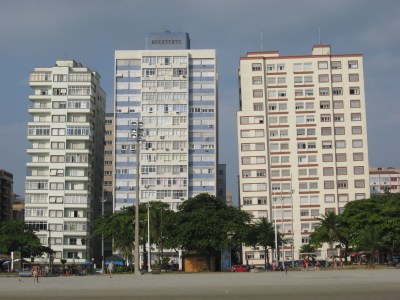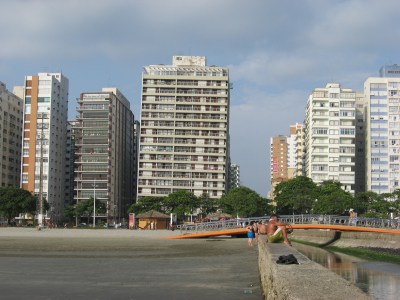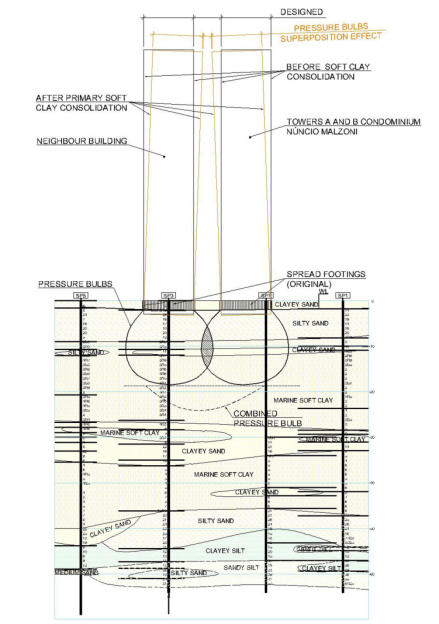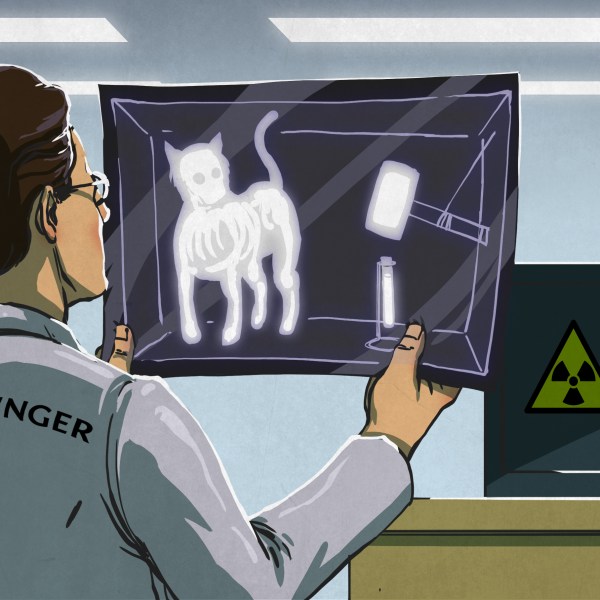If you’ve ever gazed at the shoreline of Santos, Brazil, and felt like something was tugging at your inner eye level, you’re not alone. In fact, you’ve spotted one of the world’s most bizarre architectural phenomena.
Santos is an interesting contradiction—it’s a sunny coastal city with pristine beaches that also plays host to a bustling port. What draws the eye, however, is the skyline—it’s decidedly askew. This isn’t a Photoshop job or some avant-garde urban planning experiment, either. It’s a consequence of engineering hubris, poor planning, and geology just doing its thing.
Side to Side

The Leaning Tower of Pisa is celebrated for being a building that somehow tilted over without collapsing. In Santos, though, that sort of thing barely raises an eyebrow. The city is dotted all over with buildings on the tilt. From 2004 to 2012, all 651 beachfront buildings were measured, and all were off-kilter to some degree. Some are just barely leaning over, maybe a couple of inches out of level. A more extreme example, like the Excelsior, measures 1.8 meters out of level. It’s a severe tilt that you can spot at an instant.
Santos didn’t set out to create its very own gallery of modern Leaning Towers. Most of the city’s lopsided skyscrapers were constructed in the 1950s and 1960s, during a period when Brazil’s building codes were more permissive.

Developers eager to cash in slapped together high-rise buildings with foundations only a few meters deep. This is perfectly valid when construction takes place directly on solid bedrock, but Santos sadly lacks such a convenient base. The ground is instead a bed of sand, seven meters deep, which sits upon a deeper bed of clay. Constructing the buildings with deep foundations down to the bedrock below would have avoided this problem, albeit at some expense. Instead, developers just pushed forward with the cheaper option.
Fast forward a few decades, and the problems are obvious. Over time, the towers weight tended to push out water from the clay below, leading to the buildings sinking somewhat, and often quite unevenly. The result is a skyline that looks like it’s leaning with the wind, with around 100 buildings visibly off-kilter to the naked eye. It’s a unique sight—and a rare one at that. Where else will you see modern skyscrapers looking like they’re about to fall right over?

Despite the lean, many of these buildings are still in use, most of them as residential housing. The buildings are regularly inspected and maintained, a sage decision given the ominous angles of lean. So far, there haven’t been any major catastrophies, so much as minor inconveniences. Problems with stuck doors and windows are common, and in many cases there’s an easily-detectable lean when walking around inside. Some owners choose to compensate by levelling their floor, though it’s usually still obvious there’s a problem whenever looking at the walls.
Over the years, there’s been talk of fixing the leaning buildings. Engineers have explored various means of jacking them back upright. Sadly, the cost of leveling even a single building is astronomical, and so far, only two have been corrected. Getting the buildings back into plumb involved huge hydraulic jacks, and the construction of new subfoundations able to properly support the building without further subsidence. This cost was, at the very least, offset to some degree by the fact the value of the apartments in the buildings rose significantly after correction. Still, for the rest of the buildings in Santos, though, it’s pretty much lean or bust.
It’s perhaps odd that Santos hasn’t become a global tourist trap like Pisa. Perhaps the answer lies in the scale of the leaning problem. Pisa’s single iconic tower is a historical oddity, a relic of medieval miscalculation. Santos’ slanting skyline, on the other hand, is a modern engineering mistake that doesn’t have the same romantic aura. Nor are the leaning building suitable as a tourist attraction, given the residents wouldn’t appreciate the intrusion of visitors marvelling at their wonky stairwells. Still, if you’re in the neighborhood, it’s worth a look. The beachfront is lined with these leaning giants, creating a surreal backdrop that’s equal parts charming and unsettling.
For now, Santos’ leaning towers stand as a cautionary tale. Cutting corners in construction can leave a lasting mark—sometimes a very obvious one. Next time you’re marveling at a city’s skyline, spare a thought for the ground beneath it. You never know what secrets it’s hiding—or how much it’s shifting underfoot.




















I think you are getting confused. Why would a hospital have nuclear fuel? I think you are talking about the radioactive source from a radio therapy machine. Still dangerous, but its not nuclear fuel from a reactor.
Not just Pisa… there are leaning towers in other Italian cities like Venice, Bologna and Rome.
Pisa has more than one leaning tower. Just only one super famous one. See the Church of San Michele degli Scalzi (wikipedia: https://en.wikipedia.org/wiki/San_Michele_degli_Scalzi)
I was recently in Venice and saw the big one, which is obvious. The remarkable thing is there aren’t many more in town.
It wasn’t nuclear fuel and it came from an abandoned hospital. IIRC a radiation source for cancer treatment.
Cesium-137 is hardly “nuclear fuel” but go on fear-mongering, I guess?
No, it was not “nuclear fuel” in the literal sense. It was, however, both radioactive and exceedingly dangerous.
Four people died as a direct result of exposure, including a 6-yr old girl. According to Wikipedia, “… 249 were found to have significant levels of radioactive material in or on their body. Of this group, 129 people had internal contamination. ”
If any of the survivors subsequently develop cancers or other chronic health problems, I suppose you could argue that there is no way of knowing that they wouldn’t have developed those issues anyway, had they not been exposed.
On the other hand, I submit that “internal contamination” with radioactive material is a -big- deal. No reasonable person would wave this off as trivial or inconsequential.
Bottom line, to express concern over conditions that would allow for a “Goiânia incident” is not “fear mongering.”
I’m fully aware of the incident Duck Hunter was referring to. When I wrote the comment I carefully considered my terminology. I ultimately decided to go with “fear-mongering” because calling something “nuclear fuel” brings to mind disasters on a whole different order of magnitude than 4 deaths and 250 people being contaminated and having health problems. This is especially true in the radiophobic general public.
Bottom line, I didn’t call “express[ing] concern over conditions that would allow for a “Goiânia incident”” fear-mongering, and it’s dishonest to suggest that I did. I specifically said that using the term “nuclear fuel” was fear-mongering.
Doubt I’ll ever go to Brazil. With this type of very visible lazyness toward public safety what manner of not-so-visible stuff is lurking? Also with a huge murder rate I have minimal faith my own safety from either building or humans. Lots of other places to visit. Sad though looks like an amazing place.
People die if they are killed.
What?? Somebody really ought to do something about this
To each his own… For some people, this kind of thing is a feature. You’ll find me face-down in a pile of cocaine and tanned thighs in the red light district of Medellin
Medellín, Colombia?
Ya gotta watch those piles of cocaine, they make it easy to get lost.
Yeah, is there a different one? Are you assuming that this kind of thing was restricted to Brazil for some weird reason
Yeah, see CA fires. :LOL:
Been to Brazil many times, never had an issue. So do other millions of people every year.
You could always go to Florida where on the Southwest coast the local building inspectors are letting them continue to build houses directly on the ground in places that have been wiped out multiple times by hurricanes despite FEMA regulations. Or how about all of those condos that are having problems after that collapse a few years ago? California wildfire problems? It’s not just Brazil. I’m sure that it happens all over the world.
Its a little different sitiation though. Be it wildfires or hurricanes, everything was great until it wasnt. You played the odds that the worst wouldnt happen and in the end your fate was decided by mother nature and a crazed arsonist or errant electric component. Whats happening to the towers is inevitable and avoidable by anyone with common sense. Where youre right is that its still random chance how quickly the demise occurs.
On another note, The Palisades was one of the most beautiful places to live on earth, with a luxurious climate. You can see it in the emotions of those reacting to the loss of their homes. Its foolish to think people wouldnt rebuild there.
When you believe everything you see in the media happens everywhere in one of the world’s largest countries.
“creating a surreal backdrop that’s equal parts charming and unsettling.”
Unsettling. Definitely unsettling. Gotta wonder how many more years will go by before some of these buildings begin to actually tip over.
The scariest game of dominoes
I guess after a short while, people with OCD just give up and leave the city.
One day a building will topple, dominoing dozens of others, thousands will die, there will be a huge outcry, politicians will vow to really do something this time and then nothing will happen and the slanty shanties will be rebuilt again.
If they do it right and carry on building walls th shoddy foundations it might actually work because they’ll all lean on each other?
Senior section of Brazil.
Look up Millennium Tower in San Francisco.
But when you look up, look up at an angle.
“So far, there haven’t been any major catastrophes”
Well, that’s good enough for me!
I wonder:
Do plates slide off their dinner tables?
Everyone there sleep in a hammock?
Shoes keep disappearing, always to be found at one end of the room?
I’m guessing a game of billiards is out of the question.
If corruption is an issue, you’d better go to Santos to see the lean buildings than to Pisa.
https://www.washingtonpost.com/news/worldviews/wp/2012/12/05/map-the-most-and-least-corrupt-countries-in-the-world/
… Only if you look at the 2012 data as you did.
The 2023 data shows a different picture (Brazil got worse, Italy got better)
https://www.transparency.org/en/cpi/2023
Dominos.
Oh it probably isn’t the only country where that has happened, that doesn’t seem right.
Also IIRC that wasn’t “nuclear fuel” it was a dental radiation source, which is certainly not routinely guarded by stern men with many magazines of boolit to dump into any and all interlopers. Also I think they found it at a dump or else were hired to tear down the building it was in and took it home
Welcome to the global south.
Also, much like simplifying algebra, you can simply cross out the “Totally not” at the beginning of that sentence and thus eliminate that ugly little “/s” at the end of it, say what you mean, and not have to tediously explain the joke through sarcasm notation. Sorry that thing is just a huge pet peeve of mine
You know, you can forgo the false apology at the end of your comment and just own your statement. If you were actually sorry you could’ve just not said anything. Just a pet peeve of mine.
Get a room, you two.
I will not be silent about the annoying qualities of redditors, it is a public service and helps people be less embarrassing in the future. Sorry I struck a nerve!
Can’t they just use really long augers to drill out some of the soil underneath the high side so it levels out? Drill a little, wait a bit, etc. Could be done in an afternoon.
There’s a company that fix those buildings by locking it’s columns with a bolted support, so they cut it and lift with hidraulic jacks, and after getting the build levelled, they fill the void.
Watch about it https://youtu.be/R22WWyFpjS0?feature=shared
Brazil… My rich country almost always making to the news because of it’s weaknesses…
About Santos, this réveillon there was a local epidemic case of people sick from getting in the dirty beaches, where the cities deposits it’s sewers.
Engineering in Brazil is a joke, sadly, but as a Brazilian, I’d to study in another countries to get that.
I enjoyed my short visit to Sao Paulo and Rio de Janeiro 24 years ago.
Caipirinha!
https://en.m.wikipedia.org/wiki/Caipirinha
Ah, a Brazilian! I knew that there should be at least onde here. Or two.
Não te irrita que tantas pessoas tenham uma visão tão absurdamente obtusa desse país nos comentários anteriores? :)
Far from the only country. Incidents where orphaned sources from radiotherapy units made their way into scrap metal yards, where people were then later hospitalized for radiation sickness have happened in China, Mexico, and Thailand alone.
Steel works have radiation detectors to check deliveries of scrap.
They use (recycle) existing steel when making new steel – any batch will have a percentage of recycled steel. If you get a radiation source in your scrap, it will be spread over a large volume of new steel. That will expose a great number of people (users of the finished products like cars and trucks but also buildings and tools and anything else made of steel) to hazardous levels of radiation.
This is in response to incidents where (for example) a hostpital is torn down and a radiation source (for, say, cancer treatment) gets thrown in with the steel beams and rebar from the building.
Such detectors are present in steel works all over the world – even in countries that didn’t have any well publicised radiation incidents.
Russia has a problem with people finding/stealing RTGs and using them to warm houses or for scrap.
Australia lost a capsule of something nasty a few years back, though they found fairly fast IIRC.
Have you guys noticed how people enjoy pointing out others countries problems? like hey looks how miserable is the other country!
My mother used to say that acquaintances nod along and encourage you to make a fool of yourself, but your real friends will point out your bulls*** every time.
that is because there are so many of them. there is just one home country, so all the rest is foreign, mysterious and dangerous, using a strange language, doing weird things and eating horrible food. And i’m from a tiny country, so i should know.
Uh, and pointing out how dumb other people’s comments are.
And in the UK we had a wonky pub! And then it got pulled down! And they denied doing it! And outrage! And promises to rebuild it!
Details please.
As a Brazilian, I can confidently say that these problems are not exclusive to one country or region; in fact, they are common in various parts of the world. Every nation faces its own dilemmas, and often the solutions require more than just a simple change in policy or financial investment. The quest for a world free of structural failures or risks in different social spheres seems to be a universal and complex task. What we need to understand is that difficulties and structural flaws exist in every corner of the planet, and the key to a safer, more balanced future is to work together to find solutions, recognize our vulnerabilities, and learn from the mistakes of the past.
This comment reads like AI
Also as a Santos local I can tell you this only really exists here.
Ain’t no person or country better than any other one, says woke AI.